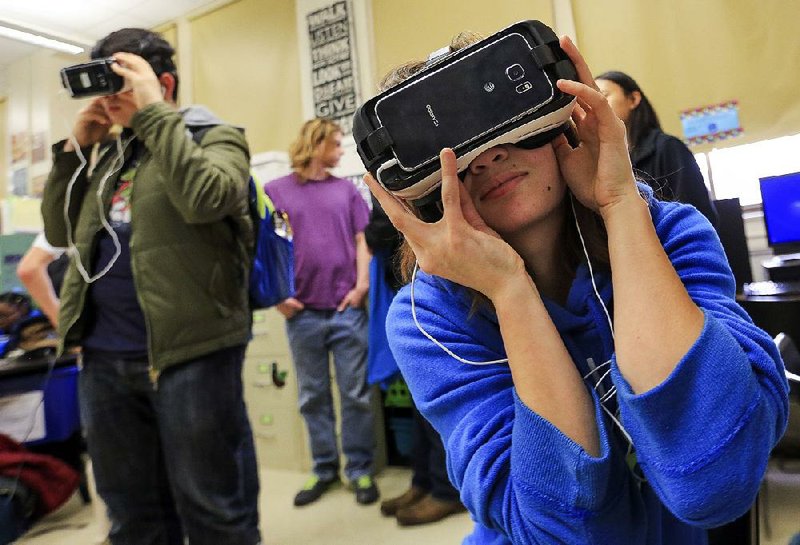Facebook Inc. is donating about $1 million in virtual-reality technology to Arkansas with a focus on low-income high schools.
State officials touted the technology as an educational tool for students and the donation as a sign that Arkansas is on technology companies' radar, thanks to Gov. Asa Hutchinson's computer-science initiative.
Officials from the social media company joined Hutchinson on Thursday to make the announcement in Central High School's auditorium. Erin Egan, vice president of U.S. public policy for Facebook, said the Arkansas announcement marks the beginning of a national program.
"We looked around the country in which states were really interested in bringing computer science to the classroom," Egan told reporters. "Gov. Hutchinson has been a leader there and so it was natural for us to pick Arkansas as the first state for us to launch this Techstart initiative."
The company is donating 500 Oculus Rift virtual-reality kits to about 250 Arkansas schools. The kits include powerful computers and sensors to track students' movements for the virtual-reality headsets.
"Whenever they can touch the technology, can put it on and they can see the reality -- the virtual reality -- of what coding can do, that's going to inspire a lot of students to say this is a future that I want to be involved in," Hutchinson said.
Students will be able to program the headsets, create virtual-reality content and explore educational software.
Egan encouraged the several hundred Central High School students in attendance to "think about this high school and the history here. Think about the kind of content you can create here."
The school was the site of the 1957 desegregation crisis that prompted President Dwight D. Eisenhower to send in federal troops to escort nine black students -- the Little Rock Nine -- into classes after Gov. Orval Faubus sent the state National Guard to bar their entry.
Thursday, Zach McCormack, a senior at Central High School, tried virtual reality for the first time during a demonstration.
"It was pretty cool. I did the basketball game -- so you were the basketball hoop and you were trying to get the balls in the bucket," he said, leaning back and forth to imitate his movements during the game. "I loved it."
During his 2014 election campaign, Hutchinson said he would make computer coding a state priority.
After entering office, he pushed a bill to provide $5 million in funding to support the program and to mandate that high schools offer the courses. The governor has asked the Legislature for an additional $5 million over the next two years.
"When we go out and we speak to other states, they just seem to have their jaws drop, honestly, because our state has put that type of commitment behind this initiative," Anthony Owen, computer-science coordinator for the Department of Education, said in an interview. "They all agree that it's the type of commitment needed to make this successful."
Recruiting and training teachers remains the initiative's No. 1 challenge, Owen said, and much of the money has gone to programs to do so.
About 5,500 high school students are taking computer-science courses this school year. That's up from about 4,000 last school year and 1,100 the year before that.
Arkansas is serving as a model for other states, Owen said. He said he's talked to officials in South Carolina, Iowa, Hawaii, Utah, Massachusetts and other states about the Arkansas initiative.
The state's initiative also has been featured in national media outlets like Time magazine, Wired and on CNBC.
Facebook isn't the only technology company to work with Arkansas on its computer-science initiative.
In December, Microsoft Corp. and the state pledged to work together on what they called a digital alliance aimed at promoting computer-science education and economic development across Arkansas.
"We're trying to make it well known that Arkansas is a state friendly to technology and technology companies," Owen said. "Our focus is not only on educating our kids but educating our kids so we can attract more business to the state."
With cameras rolling and reporters scribbling on notepads, the governor invited Facebook co-founder Mark Zuckerberg to Arkansas.
Egan said Zuckerberg will visit 30 states in 2017.
"I know he's looking forward to coming here," she said.
Metro on 01/06/2017

